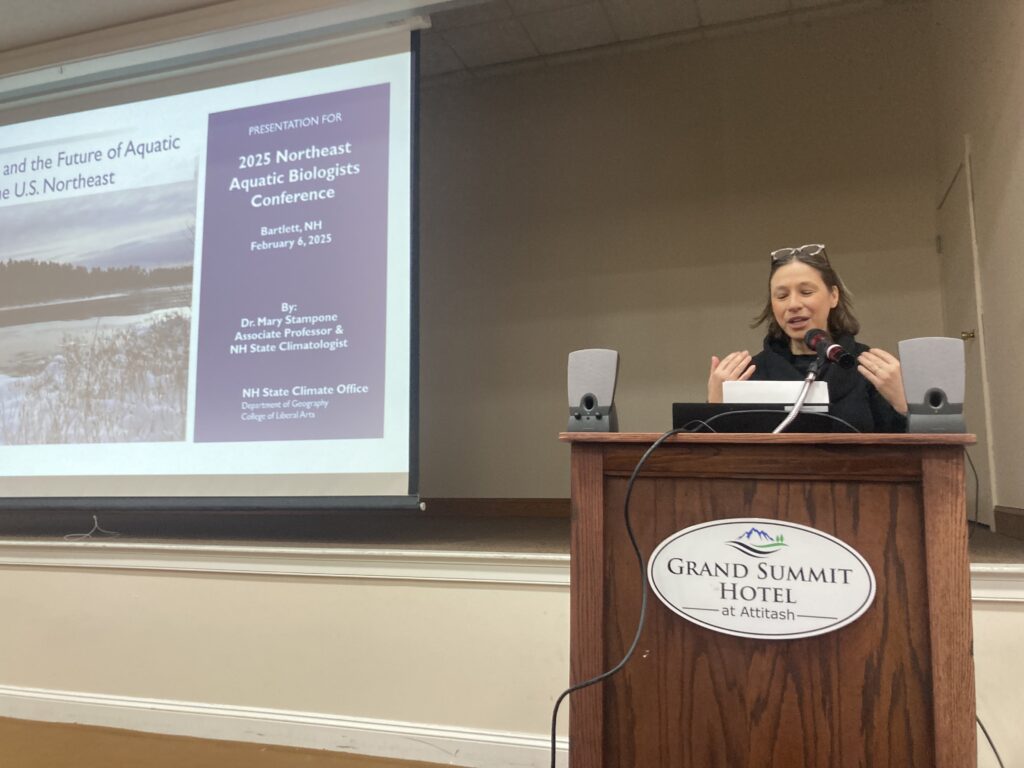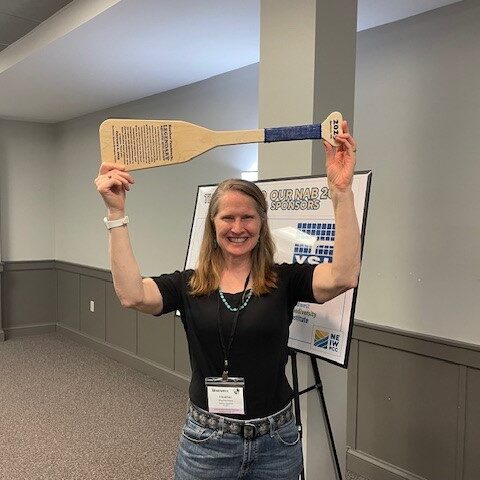More than 170 aquatic and environmental biologists gathered in Bartlett, New Hampshire for the annual Northeast Aquatic Biologists (NAB) Conference. Attendees represented state, federal, tribal and municipal governments, the private sector, academia, and watershed organizations from across New England and New York to share research and network.
The three-day conference opened with remarks from NEIWPCC Commissioner Tom Ballestero, who is also the director of the University of New Hampshire Stormwater Center, and Dave Neils, watershed management bureau administrator at the New Hampshire Department of Environmental Services (NH DES). They highlighted the NAB community’s history and emphasized the importance of collaboration among aquatic biologists across the region.
Mary Stampone, a geography professor at the University of New Hampshire and the state’s climatologist, delivered the plenary address. She shared her research on regional patterns and discussed the impact of hydroclimatic hazards, such as drought, flooding, and severe weather, on the Northeast’s aquatic ecosystems.

More than 50 speakers presented on a range of topics, including chloride impacts on streams, cyanobacteria and harmful algal blooms, and long-term monitoring networks. A post-conference survey identified a concurrent session on lakes as a crowd favorite. During this session, presenters Benjamin Block of Tetra Tech, Kellie Merrell of the Vermont Department of Environmental Conservation (VT DEC), Kirsten Hugger of NH DES, Jeremy Deeds of the Maine Department of Environmental Protection (ME DEP), and Alene Onion of the New York State Department of Environmental Conservation (NYS DEC) discussed aquatic ecosystem assessment, invasive species and volunteer monitoring, and tools for evaluating and communicating lake health in different communities throughout the region.
The poster session showcased research from approximately 25 additional presenters, covering topics such as water quality and biological monitoring, community science, and ecosystem restoration studies. Attendees engaged with presenters in discussions about their research methodologies, findings, and potential applications, fostering information exchange and collaboration across various disciplines and across the region.

During the annual banquet, the 2025 Legendary Aquatic Biologist Awards honored Rosemary Gatter-Evarts, environmental analyst with the Connecticut Department of Energy and Environmental Protection (CT DEEP), Dave Neils, administrator of the Watershed Management Bureau with the NH DES, and Heather Pembrook, deputy director of the VT DEC, for their dedication to advancing science and policy to protect the region’s aquatic resources.
Additional awards recognized outstanding undergraduate, graduate, and Ph.D. student presentations. Christiana Korkor Teye of the University of Maine received the best oral presentation award, while Kayla Pacheco of the University of Massachusetts Amherst and Quin Shingai of Dartmouth College were honored for their poster presentations.
The conference was organized by NEIWPCC in partnership with its member states and the U.S. Environmental Protection Agency (U.S. EPA). The NAB planning team included Maryann Dugan, Megan Nickerson, Richard Friesner and Julianna Stucki of NEIWPCC; Dave Neils and Maxwell Maynard of NH DES; Mary Becker of CT DEEP; Tom Danielson and Jeremy Deeds of ME DEP; Steven Bittner of the Massachusetts Department of Environmental Protection; Zachary Smith, Alene Onion and Matthew Kraft of NYS DEC; Jane Sawyers of the Rhode Island Department of Environmental Management; Kellie Merrell and Ryan Walquist of VT DEC; and Corey Conville of the U.S. EPA.
The 2026 NAB Conference will take place in Connecticut, with updates to be posted on the event webpage as details become available.